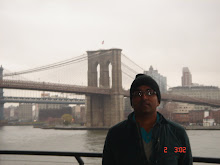Understanding Capitalism
Recently(Confluence at IIMA in Nov 2009), Gurcharan Das( ex-CEO of P&G) spoke highly of capitalism, and even going to the extent of calling the CSR (corporate social responsibility) a false bogey. For the people of his ilk, capitalism is a panacea for all ills, including those not yet created.
When I try to understand Gurcharan Das's comments on the idea (or theory) of capitalism in the backdrop of Barack Obama's analysis of the financial meltdown, I wonder how little do we understand of what we speak, only to realize that we have not yet fathomed the depths ( or layers) of theories as it unravels in different contexts, and at different times. Obama mentioned that greed and irresponsibility brought shame to the world and brought a greater shame to capitalism and its pundits. And here is another guru propounding that social responsibility is a sham and corporates exit only to make money, and that their social responsibility ends by creating jobs and increasing shareholders' value.
I still remember Narayan Murthy's words on creating wealth in the backdrop of the idea of socialism. He said in poor country, all one can do was to distribute poverty. He said he would rather first create wealth( in the society), and then distribute richness to everyone. Infosys is a telling example to all that socialism and capitalism can go hand in hand, and that greed is NOT always good. By Das' own admission, we need more practice of Dharma in today's world, since we in our day to day activities are unable to balance our life's priorities. Today, capitalism assumes that making money is good, and making more money is even better; shareholders' value creation is the utmost goal of the company; profits is what companies survive and grow for; everyone should earn for him/her self and spend on him/her self; spending is better than saving;
All of these are assumptions of the theory of capitalism, and only that-assumptions. No where do we find an iota of evidence to prove that these are ultimate truths that we cannot abandon for good. For good f the humanity. Thanks to the financial meltdown we are now forced to revisit and revise the existing assumptions of the theory of capitalism.
Probably it requires another financial meltdown before we realize that this theory is faulty, and needs to be abandoned. We need to wait for that time to understand capitalism. Or we can understand that without paying such a high price for it. The choice is only ours.
If only the poor people in the world could think....

